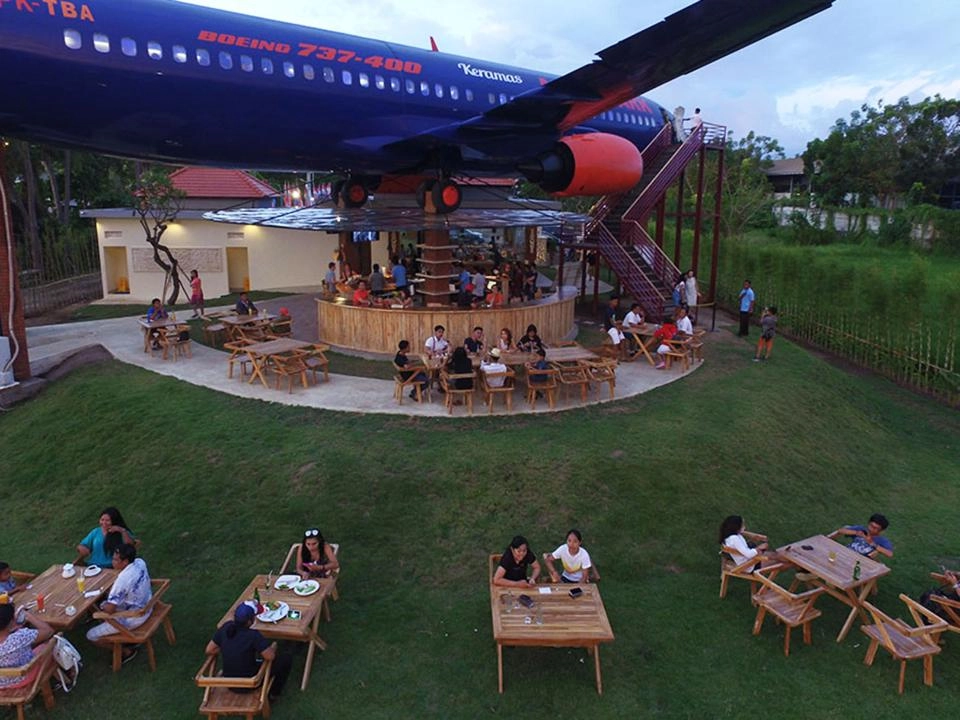Opening a restaurant in Bali as a foreigner: the ultimate guide
Opening a restaurant in Bali is a dream for many foreigners. The good news is that it is also one of the best ways to live on the island as an expat for the ones who succeed in that mission.
Let’s detail what you’ll need as a foreigner to open your own restaurant in Bali.
Why is Bali perfect for your restaurant business?
Before we dive into what you need to open your restaurant in Bali, you might want to know if opening a restaurant in Bali is a good idea in the first place. Spoiler alert, the answer is usually yes.
Bali welcomes 1 million tourist each MONTH
If you didn’t get the memo yet, Bali is a very touristic island. On average, when you sum up international and domestic tourists, more than 1 million people land on the island each month. Yes, each month.
Needless to say, very few of them come with the firm intention to cook their own meals. Whether they come from Europe, Australia, US, Singapore or Indonesia, they all spend a significant amount of their budget into restaurants, because that’s simply what Bali is all about.
All restaurant concepts stand a chance in Bali
Another reason why Bali is so popular with restaurants is that it simply is an island where virtually all concepts can work.
The combination of domestic and international tourism from all over the world, the various budgets, cultures and tastes make Bali a great place to simply try everything.
If there is an innovative restaurant concept, you can be sure someone wants to try it in Bali.

Bali is an international stage with the best chefs
Over the recent years, Bali has shifted from a “simple” touristic area to a location where the best concepts but also the best chefs compete.
Simply put, the quality of restaurants in Bali is amazing, and tourists know it. And given the numbers of tourists, chefs have an international stage to express themselves when they set up shop in Bali.
The takeout and food delivery is huge in Bali
An aspect that is very often overlooked, especially from the ones not familiar with SE Asia is how big the takeout and food delivery really is in areas like Bali.
Locals are all using a form of takeout, called “bungkus” and the Uber-like platforms such as Grab or Gojek are widely used by locals, expats, nomads and of course tourists, even for relatively high-end meals.
So if your restaurant idea fits into the takeout and delivery culture, you will certainly find your crowd.

The staff needed to run restaurants are qualified and relatively cheap in Bali
Staffing and running a restaurant in Bali is relatively easy compared to other places. Given the importance of the tourism industry on the island, many local balinese have been studying hospitality and are therefore well trained.
Since the island is multicultural and geared towards international guests, most of them have also been exposed to international cuisine from all over the world.
Running a restaurant in Bali is cheaper and with lower taxes than in most countries
If you come from a country where the cost of living is high, you might be surprised by the total cost of running a restaurant in Bali.
Salaries are much lower than in many other countries, but taxes are also kept at bay, which make concepts that wouldn’t work in other countries doable in Bali.
What you must know before opening a restaurant in Bali
Before booking the next flight to Bali and opening your restaurant, there are a few things you must know.
Opening a restaurant as a foreigner isn’t the same as opening a restaurant as an Indonesian citizen
If you’ve been to Bali, chances are you’ve seen small informal warungs run by local Indonesians. If it is technically and legally possible for an Indonesian citizen to do so, that is not the case for foreigners.
By law, a foreign-owned restaurant will have to meet certain criterias. Among the main ones:
- Be relatively “large-scale”: minimum 50 seats
- Be under a foreign-owned company
- Have all licences and paperwork required to operate
So if opening a restaurant in Bali as a foreigner is indeed possible, it still requires a level of “legality” and investment that automatically excludes the very small projects from the equation.
Location is a huge factor in the success (or failure) of your restaurant in Bali
One aspect that is also often overlooked in Bali is how important the location is for a restaurant.
Restaurants that are in the most strategic locations in Bali tend to do a lot better than the ones who don’t, regardless of their menus or their reputation. There is simply a lot of foot traffic in some areas that bring a lot of hungry customers, while others do not.
You basically have a few good options here:
- Have your restaurant as close as possible from where tourists walk (think Seminyak, Legian or Sanur either in the city or beachfront)
- Open a restaurant near expats and digital nomads hubs where people live or work
- Establish your restaurant in one of the popular malls in Bali
- Open your restaurant in a trendy natural location

Legal things you’ll need to open a restaurant in Bali as a foreigner
Here are the legal documents and other sorts of paperwork you will need to open a restaurant in Bali as a foreigner.
A foreign-owned limited company or PT-PMA
PT-PMA are a type of limited liability company similar to a LLC or a LTD, but specifically made for the cases when one or more investors is a foreigner.
There is no way around it, if you want to open a restaurant in Indonesia, you’ll need to have it under a PT-PMA.
PT-PMA are relatively straightforward to open, but the minimum capital to invest is IDR 10 Billion (around USD 700K). You do not need to have the full amount at the start of your restaurant journey, but you’ll have to declare 25% paid, and the rest can be fulfilled over time. Of course, all investments you made into the business can be a part of this capital (equipment, building etc…).
A Tax ID for your restaurant and for yourself
Like anywhere in the world, having a restaurant in Bali means you’ll have to pay taxes to the Indonesian government, mainly through VAT, but also social contributions to your team.
For that, you’ll need a tax ID, called an NPWP for your company. You will also need this for yourself as an Indonesian taxpayer.
On the subject: What is a NPWP and what are the benefits to have one?
A restaurant licence to legally be able to operate
Most businesses in Indonesia need a permit to operate. For a restaurant, you’ll need a restaurant licence known as Sertifikat Standar.
A location permit for the restaurant
The location permit, also known as SITU, is mandatory to operate a restaurant as it is a guarantee that you are running your business in a zone that allows you to do so.
This permit requires the approval of the village you establish your business in, and their community known as “banjar”.
Since leases can be very long in Indonesia (sometimes up to 20 years) and that you pay them upfront, it is essential to have this document in order before you pay your lease.
See our land zoning due diligence services here.
An alcohol licence if you intend to sell or serve alcohol
Selling or serving alcohol in Indonesia is a regulated activity that requires you to apply for a specific licence.
So if your restaurant or bar needs to sell the infamous Bintang or Mojitos, you’ll need to get this licence beforehand if you don’t want to run into troubles.
An import permit if you need ingredients that are not available in Indonesia
Imports and exports in Indonesia are heavily regulated and monitored. A business is not allowed to export or import goods without a permit, and restaurants aren’t an exception.
If your restaurant serves an international cuisine that isn’t commonly found in Bali and requires frequent imports, you’ll have to apply for an import / export permit for your restaurant.
A notarised lease (if you are not the owner of the building)
Leases are usually running several years forward in Indonesia. Most business leases are signed for a duration of 5 or 10 years, always paid upfront.
Given the amount it can represent, it is not only advised to be very careful before committing, but also to get legal experts by your side to have the contract checked and legally binding.
We can of course help you get your land or building rental contract completely legalised.
A building permit (if you are building your restaurant from the ground up)
If you intend to build a restaurant in a new building from scratch, you’ll need a building permit to do so. It is known as PBG and mandatory for all buildings, restaurants included.
A resident permit called KITAS for yourself
Most people who open restaurants in Bali do so to be able to sustain themselves on the island.
As a business owner, you will be entitled to a residence visa called a KITAS, which allows you to enjoy a lot of benefits such as getting in and out of Indonesia freely, being able to open bank accounts, obtain driving licences and in some cases work / earn money locally.
As a restaurant owner with a PT-PMA in Bali, you mainly have two options:
- Pick an investment KITAS if you are not actively working in your restaurant and/or if you are the director of the PT-PMA.
- Pick a working KITAS sponsored by your company if you are actively working in your restaurant and that you are not the director of the PT-PMA
Note that the working KITAS also requires you to apply for a work permit before being able to legally work.
On the subject: KITAS: everything you should know.
Hiring staff as a foreign-owned restaurant in Bali
A restaurant is a resource intensive business that almost always requires you to hire staff. Here is what you must know as a foreign restaurant owner.
All your staff must have employment contracts, be on the payroll and registered to social security
Since a foreign-owned restaurant is like any type of limited liability company, all the staff you hired, local or foreign, must be declared to the relevant authorities. That includes:
- Have employment contracts
- Be registered and contribute to the social security (BPJS Kesehatan)
- Contribute to the retirement system (BPJS Ketenagakerjaan)
- Provision their withholding tax
- Have the relevant visas and work permits if they are foreigners
If you are unsure about how to run a payroll or how to set up your accounting for your restaurant, feel free to contact us.
Hiring foreign staff for a restaurant is permitted but limited to certain positions
You are probably wondering if you can hire foreign staff in your restaurant.
The answer is… it depends.
As a restaurant owner, you are only allowed to hire foreign chefs and restaurant managers such as a finance manager, a marketing manager or simply a general manager.
You will however not be able to hire foreign waiters, foreign hostesses or foreign security for instance.
Naturally, all the foreign staff will need a working KITAS, their tax ID (NPWP) and contribute to social security and retirement schemes like any staff.
How long does it usually take to open a restaurant in Bali?
The total duration between the moment you start the procedures to open your restaurant in Bali and your grand opening depends on a lot of factors.
6 months is usually the minimum time to get everything running legally, if you don’t have a lot of construction / complicated set up for your restaurant.
For more complicated restaurant concepts, it can go as high as 18 months.
How much does it usually cost to open a restaurant in Bali?
The cost to open a restaurant in Bali varies tremendously depending on the size of the business, its location, its equipment or the renovation / building you might need.
But as a general rule of thumbs, you can plan for at least 2 Billion Indonesian Rupiah, with no upper limit for the bigger / more complex projects.
Conclusion
Opening a restaurant is a rather sure way to make a stable living in Bali as a foreigner.
Of course, it requires some set up and thorough considerations, but it’s an adventure that is well worth it.
Get in touch with us if you need legal advice for your restaurant project in Bali.





